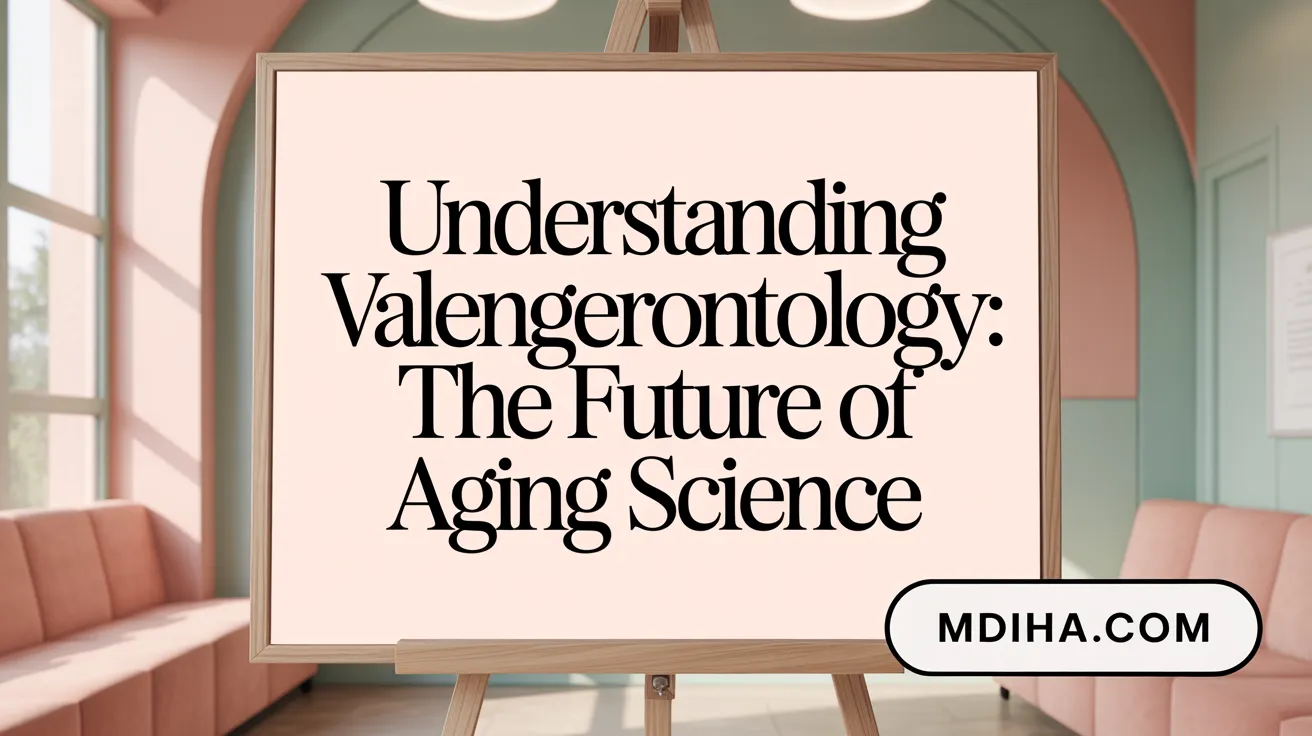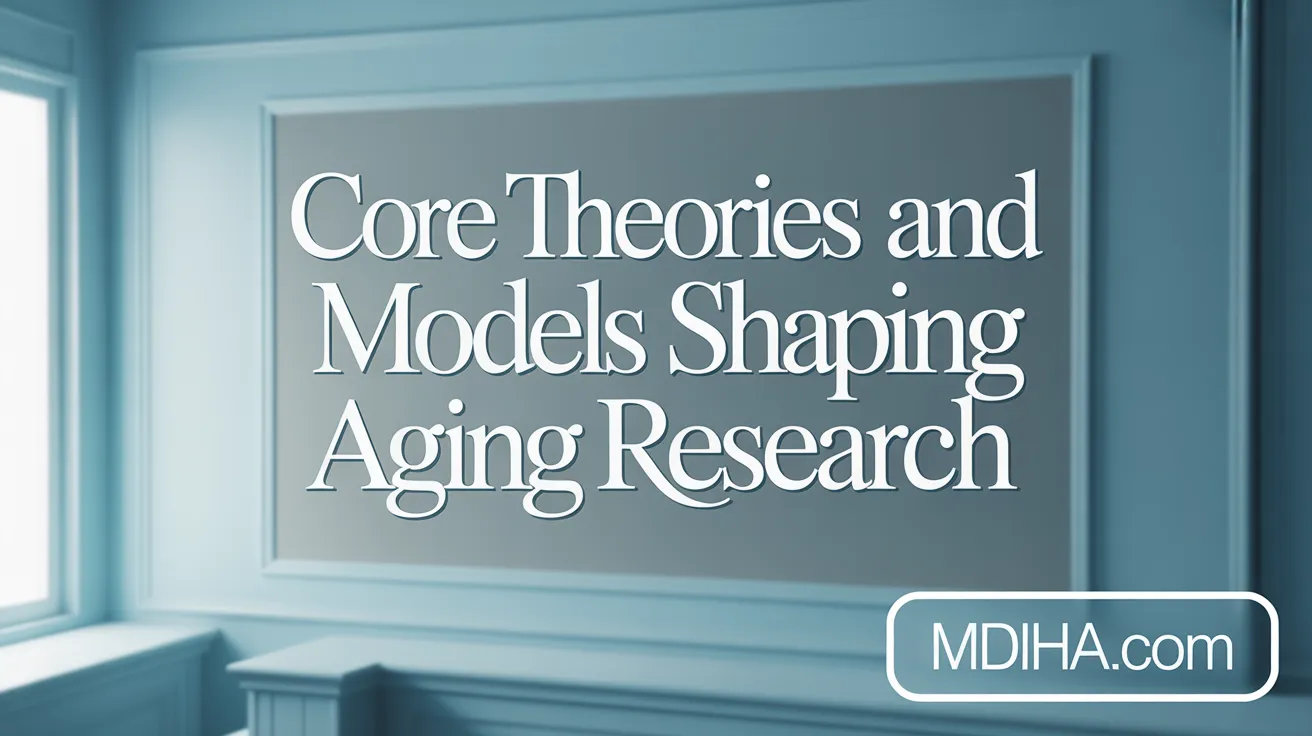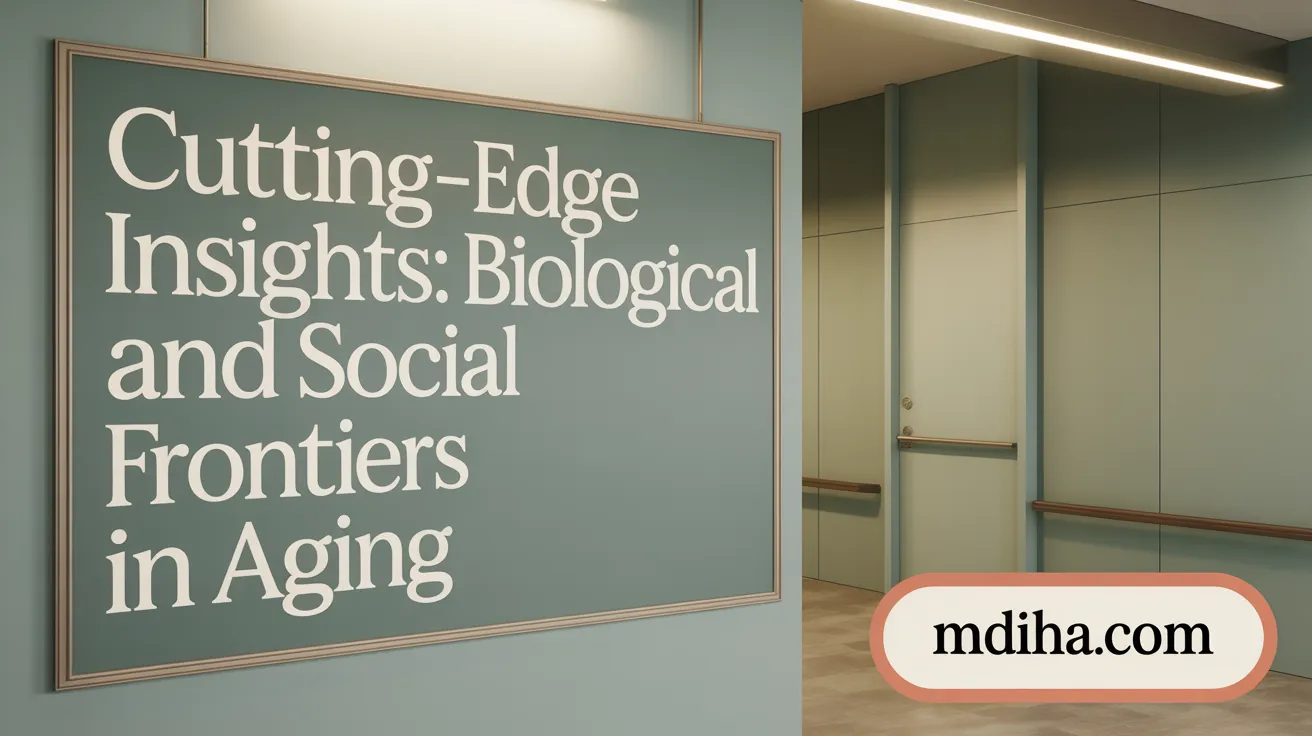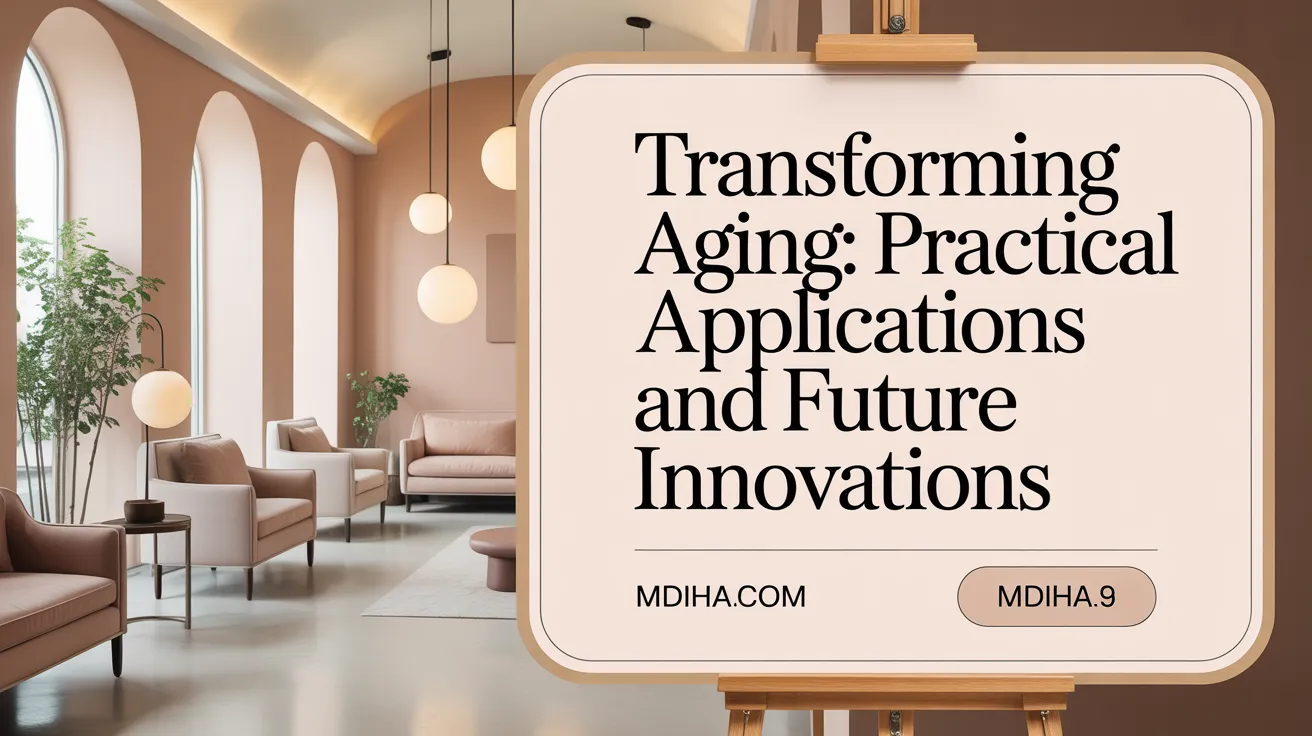Exploring the Science and Significance of Valengerontology
Valengerontology, a specialized branch within gerontology, delves deeply into the interdisciplinary study of aging, focusing on the biological, psychological, and social facets influencing how individuals grow older. As populations across the globe experience unprecedented longevity, this field offers essential insights and practical strategies to ensure that extended years are lived with health, independence, and fulfillment. This article introduces readers to the foundational concepts of Valengerontology, underscores its importance in understanding aging, and explores the research and applications that drive healthy aging in today's society.
Defining Valengerontology and Its Importance in Aging Research
 Gerontology is a comprehensive discipline that investigates the biological, psychological, social, and societal aspects of aging. It studies the changes that occur after maturity and throughout later life, aiming to enhance the well-being and independence of older adults.
Gerontology is a comprehensive discipline that investigates the biological, psychological, social, and societal aspects of aging. It studies the changes that occur after maturity and throughout later life, aiming to enhance the well-being and independence of older adults.
Valengerontology, a subdivision of gerontology, focuses specifically on older age and the developmental processes associated with it. This specialization emphasizes understanding aging from multiple perspectives, including physical health, cognitive function, emotional resilience, and social inclusion.
The field of gerontology is inherently multidisciplinary. It pulls from biology, psychology, sociology, and public health to develop a complete picture of aging. Researchers examine cellular processes such as telomere shortening, oxidative stress, and immune decline, alongside the social factors like ageism and access to social support, which all influence quality of life.
Unlike geriatrics, which primarily concerns medical treatment of age-related diseases, gerontology aims to improve overall life quality. Its scope includes creating age-friendly communities, promoting healthy lifestyles, and shaping policies to manage the societal impacts of an aging population.
Studying how and why people age is vital as global demographics shift, with increasing numbers of older adults worldwide. This rise poses challenges for healthcare systems, economic stability, and social services. By understanding aging processes, gerontology supports the development of interventions that extend healthspan—the period of life spent in good health—reducing healthcare costs and enhancing societal participation.
Research from experts like Valter Longo illustrates the potential for dietary strategies, such as fasting mimicking diets, to promote regeneration and fight age-related diseases, emphasizing the scientific advances within this field.
In summary, gerontology and valengerontology are key to preparing societies for demographic changes. They foster innovations in health, policy, and urban planning that help societies thrive as the population ages.
Key Concepts, Theories, and Models in Valengerontology
 Gerontology is a broad, multidisciplinary field that studies the complex process of aging and the diverse issues that impact older adults. It encompasses biological, psychological, and social dimensions, offering a comprehensive understanding of aging as a dynamic and heterogeneous process.
Gerontology is a broad, multidisciplinary field that studies the complex process of aging and the diverse issues that impact older adults. It encompasses biological, psychological, and social dimensions, offering a comprehensive understanding of aging as a dynamic and heterogeneous process.
One of the foundational frameworks in gerontology is the biopsychosocial model. This model emphasizes the interactions among biological factors such as genetic and cellular processes, psychological aspects like cognitive and emotional health, and social influences including social roles, support systems, and societal attitudes. It underscores that aging is not solely a biological decline but also involves social adaptation and mental well-being.
In terms of aging theories, biological models focus on genetic and cellular mechanisms. For instance, research points to genetic control over lifespan and healthspan, with processes like telomere shortening and oxidative stress playing roles at the cellular level. Certain programmed theories suggest that genetic regulation guides aging, while damage-based theories highlight the accumulation of cellular damage over time, such as DNA mutations.
Psychological theories, including disengagement and activity theories, explore how older adults adapt to aging through social withdrawal or continued engagement. These perspectives emphasize the importance of mental resilience and maintaining social connections for successful aging.
Sociological models address societal roles and cultural perceptions of aging. They examine how ageism and social policies influence older adults’ quality of life and societal participation.
The life course perspective offers an overarching view, considering aging as a process influenced by lifelong biological, psychological, and social factors. It recognizes that aging trajectories vary widely among individuals based on genetics, lifestyle, and environmental exposures.
Recent advances highlight the importance of integrated perspectives that recognize heterogeneity in aging experiences. These models acknowledge that some individuals, despite chronic conditions, can age successfully with high social and psychological well-being.
Below is a summary table that encapsulates the different models, theories, and their focus areas:
| Model/Theory | Focus Area | Description |
|---|---|---|
| Biopsychosocial Model | Biological, Psychological, Social | Interactions among bodily health, mental state, and social environment in aging |
| Genetic and Cellular Theories | Cellular and molecular biology | Genetic control, telomeres, oxidative stress, and programmed cellular aging processes |
| Damage Accumulation Theories | Cellular damage | Free radicals, DNA mutations, and wear-and-tear mechanisms over time |
| Disengagement Theory | Social adaptation | Older adults withdraw from societal roles; viewed as a natural and mutual process |
| Activity Theory | Social engagement | Success in aging linked to active participation and social involvement |
| Socio-cultural Models | Cultural influences and societal roles | Impact of cultural attitudes and societal structures on aging experiences |
| Life Course Perspective | Entire lifespan | Aging shaped by experiences, choices, and exposures across life stages |
Understanding these frameworks and theories provides a sophisticated backdrop for addressing aging’s challenges and opportunities. They guide researchers, policymakers, and practitioners in developing strategies that promote healthy, successful aging in diverse populations.
Research Frontiers in Valengerontology: Biological and Social Insights

What are some major theories and research areas within gerontology related to aging?
Gerontology, the study of aging, encompasses a wide array of theories and research areas that aim to understand the complex processes of growing older. Scientific advances have shed light on both biological and social aspects that influence aging, leading to innovative approaches for promoting healthspan and well-being.
Biological research in gerontology investigates cellular and molecular mechanisms such as telomere shortening, oxidative stress, and mitochondrial damage that contribute to aging. Theories like programmed aging suggest that biological clocks, including hormonal and immunological systems, regulate lifespan. Damage-based theories, including free radical damage and protein cross-linking, focus on deterioration at the cellular level over time.
Recent studies have explored how genetic factors influence both lifespan and healthspan. For instance, research by Valter Longo has shown that cycles of fasting mimicking diets can trigger regenerative processes across multiple organ systems, possibly extending healthy years of life. These diets have also demonstrated potential in reducing symptoms of diseases like multiple sclerosis.
Sociological and psychological research emphasizes how social roles, support networks, and emotional adaptation shape aging experiences. Social engagement and psychological resilience enable many older adults to age successfully, even when faced with chronic conditions.
Overall, gerontology integrates these biological and social insights, aiming not just to add years to life but to improve the quality of those years. Current research continues to explore pathways to extend healthspan, reduce disease burden, and foster environments that support aging populations.
| Research Focus Area | Main Concepts | Notable Findings |
|---|---|---|
| Genetic Influences | Telomeres, epigenetics, mitochondrial function | Longo’s fasting diets induce regeneration |
| Molecular Pathways | mTOR, sirtuins | Potential targets for extending healthspan |
| Social and Psychological Factors | Social support, adaptation | Social engagement linked to successful aging |
| Healthspan Strategies | Diet, environment, lifelong learning | Interventions to improve aging process |
This multidisciplinary approach aims to unlock new pathways for healthier aging, considering both biological foundations and the social fabric that supports well-being in older age.
Promoting Healthy and Successful Aging Through Valengerontology

What is the concept and how does its multidimensional nature influence aging?
Successful aging is a broad concept that aims to extend the period of life spent in good health, active engagement, and psychological well-being. It emphasizes maintaining functional ability in physical, cognitive, and social domains. This approach recognizes that aging is not merely about avoiding disease but involves a holistic view that includes social and emotional factors.
The idea of aging successfully has evolved from a purely biomedical focus to include social and psychological adaptation. It considers how individuals adapt to age-related changes and preserve quality of life despite health challenges.
How do biological, cognitive, and psychosocial factors contribute?
Biological factors like genetics influence lifespan and healthspan, determining whether a person lives to 80 or 100 years. Cognitive function and physical ability are vital markers of successful aging, reflecting an individual's capacity to perform daily activities and maintain independence.
Psychosocial factors such as social engagement, psychological resilience, and emotional well-being are equally important. Studies show that maintaining social connections and psychological health can improve aging outcomes, even among those with chronic diseases.
Why are social engagement and psychological adaptation critical?
Social engagement helps prevent loneliness and supports mental health, which are linked to better physical health and longer life. Psychological adaptation enables older adults to cope with inevitable age-related changes, supporting resilience and overall happiness.
Programs that promote social activities, learning opportunities, and community involvement are essential strategies for fostering aging well. These efforts help bridge the social and emotional gaps that may develop over time.
How does research in gerontology inform community and public health initiatives?
Gerontology research provides insights that help shape policies and programs aimed at healthy aging. For example, understanding cellular processes like telomere shortening or immune decline informs preventive healthcare strategies.
Public health initiatives now include promoting vaccinations, screenings, and lifestyle changes, alongside creating age-friendly environments that support active living.
Technology plays a role too, with telehealth and wearable devices improving health monitoring and access to care, especially in underserved communities.
What role does Valengerontology play in shaping interventions and policies?
Valengerontology, a specialized area within gerontology, focuses on applying research discoveries to improve health outcomes specifically in aging populations. Researchers like Valter Longo explore dietary interventions, such as fasting mimicking diets, which have potential to extend healthspan and treat diseases like multiple sclerosis.
This field influences policies aimed at reducing healthcare costs and increasing the number of healthy, long-lived individuals. It encourages integrating scientific advances into community-based programs, healthcare practices, and public health strategies.
| Aspect | Focus Area | Impact |
|---|---|---|
| Biological Factors | Genetics, cellular processes | Determine lifespan and healthspan |
| Cognitive and Physical Function | Maintenance of abilities | Essential for independence and quality of life |
| Psychosocial Factors | Social engagement, emotional health | Improve mental health and resilience |
| Community and Policy | Infrastructure, health education | Support healthier aging environments |
Understanding how these elements interact helps create comprehensive strategies for aging well, emphasizing prevention, adaptation, and community support.
Practical Applications and Future Directions in Valengerontology

How has gerontology contributed to practical applications in aging research and care?
Gerontology has played a crucial role in transforming aging research into tangible benefits for older adults. By translating scientific discoveries into innovative treatments and preventive strategies, the field helps improve health outcomes, mobility, and independence for seniors.
Institutions like the National Institute on Aging (NIA) support research that leads to the development of new therapies and personalized healthcare solutions. For example, clinical trials focusing on multi-chronic conditions have refined approaches for managing complex health issues.
Large research hubs such as Pepper Centers foster interdisciplinary work, advancing understanding of aging mechanisms through biomarker studies and aging models. These efforts inform public health policies and lead to the design of age-friendly communities.
Gerontology also influences social programs and technological innovation. Assistive devices, telehealth, and community initiatives promote active, engaged aging, reducing healthcare costs and enhancing quality of life.
Innovations in treatment and preventive care
Recent advances include treatments targeting cellular aging processes, such as telomere maintenance and oxidative damage reduction. Preventive care strategies emphasize vaccinations, routine screenings, and lifestyle interventions to delay or prevent age-related diseases.
Emerging research on fasting-mimicking diets, inspired by studies like those by Valter Longo, shows promising results in extending healthspan and even reversing certain disease symptoms. These biological interventions aim to promote multi-system rejuvenation.
Role in policy development and age-friendly environments
Gerontologists influence policies that create inclusive communities. These policies focus on accessibility, social engagement, and lifelong learning, which are vital for healthy aging.
Promoting social participation and combating ageism are central objectives, with research guiding best practices to ensure older adults remain active contributors to society.
Technological advances supporting older adults
Technologies such as wearable health monitors, smart home devices, and telehealth platforms enable continuous health management and support independent living.
Research in gerontology helps tailor these technologies to meet the specific needs of older users, enhancing safety and improving healthcare access.
Future challenges and opportunities
As the global population ages rapidly, challenges include managing increased healthcare demand and addressing disparities among different socioeconomic groups.
Opportunities lie in personalized medicine, regenerative therapies, and community-based prevention. Future research will likely focus on integrating biological, psychological, and social data to create comprehensive aging strategies.
Continued investment in gerontology research promises to unlock innovative interventions that can extend not only lifespan but also healthspan, ensuring aging populations lead healthier, more fulfilled lives.
| Area | Focus | Future Direction |
|---|---|---|
| Biological | Cellular therapies, biomarkers | Targeted regenerative treatments |
| Clinical | Preventive measures, personalized care | Optimized health management |
| Policy | Age-friendly environments | Inclusive policies for diverse needs |
| Technology | Assistive devices, smart health solutions | Data-driven health support |
| Social | Reducing ageism, promoting engagement | Community integration and lifelong learning |
Embracing Valengerontology for a Healthier Aging Future
Valengerontology stands at the forefront of aging science, integrating diverse fields to unravel the complexities of growing older and to foster conditions for living well into advanced age. By understanding the biological foundations, psychological adjustments, and social dynamics of aging, this evolving discipline empowers individuals, communities, and policymakers to implement informed strategies that enhance healthspan and quality of life. As research continues to unlock new pathways and interventions, the promise of Valengerontology lies in its capacity to transform aging from a challenge into an opportunity for lifelong well-being and societal vitality.
References
- An Introduction to Gerontology | Request PDF
- Introduction (Chapter 1) - An Introduction to Gerontology
- Dr. Valter Longo on His Research into Longevity
- Definitions of successful ageing: A brief review ...
- Understanding the Science of Aging and its Impact on
- Gerontology in Public Health: A Scoping Review of Current ...
- The Practice of Gerontology: What Is It?
- What Is a Gerontologist? The Practice of Gerontology
